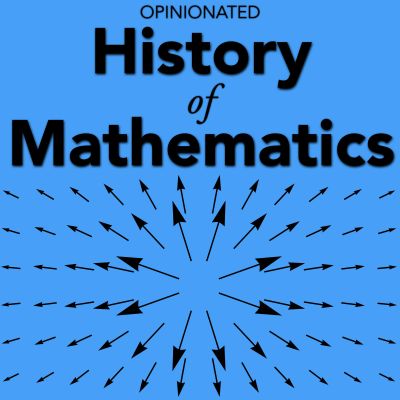Cracking tales of historical mathematics and its interplay with science, philosophy, and culture. Revisionist history galore. Contrarian takes on received wisdom. Implications for teaching. Informed by current scholarship. By Dr Viktor Blåsjö.
https://intellectualmathematics.com/blog/
Gesamtlänge aller Episoden: 1 day 45 minutes
Why construct?
Euclid spends a lot of time in the Elements constructing figures with his ubiquitous ruler and compass. Why did he think this was important? Why did he think this was better than a geometry that has only theorems and no constructions? In fact,
Created equal: Euclid’s Postulates 1-4
The etymology of the term “postulate” suggests that Euclid’s axioms were once questioned. Indeed, the drawing of lines and circles can be regarded as depending on motion, which is supposedly proved impossible by Zeno’s paradoxes.
That which has no part: Euclid’s definitions
Euclid’s definitions of point, line, and straightness allow a range of mathematical and philosophical interpretation. Historically, however, these definitions may not have been in the original text of the Elements at all. Regardless,
What makes a good axiom?
How should axioms be justified? By appeal to intuition, or sensory perception? Or are axioms legitimated merely indirectly, by their logical consequences? Plato and Aristotle disagreed, and later Newton disagreed even more.
Consequentia mirabilis: the dream of reduction to logic
Euclid’s Elements, read backwards, reduces complex truths to simpler ones, such as the Pythagorean Theorem to the parallelogram area theorem, and that in turn to triangle congruence. How far can this reductive process be taken,
Read Euclid backwards: history and purpose of Pythagorean Theorem
The Pythagorean Theorem might have been used in antiquity to build the pyramids, dig tunnels through mountains, and predict eclipse durations, it has been said. But maybe the main interest in the theorem was always more theoretical.
Singing Euclid: the oral character of Greek geometry
Greek geometry is written in a style adapted to oral teaching. Mathematicians memorised theorems the way bards memorised poems. Several oddities about how Euclid’s Elements is written can be explained this way.
First proofs: Thales and the beginnings of geometry
Proof-oriented geometry began with Thales. The theorems attributed to him encapsulate two modes of doing mathematics, suggesting that the idea of proof could have come from either of two sources: attention to patterns and relations that emerge from exp...
Societal role of geometry in early civilisations
In ancient Mesopotamia and Egypt, mathematics meant law and order. Specialised mathematical technocrats were deployed to settle conflicts regarding taxes, trade contracts, and inheritance. Mathematics enabled states to develop civil branches of governm...
Why the Greeks?
The Greek islands were geographically predisposed to democracy. The ritualised, antagonistic debates of parliaments and law courts were then generalised to all philosophical domains, creating a unique intellectual climate that put a premium on adversar...
